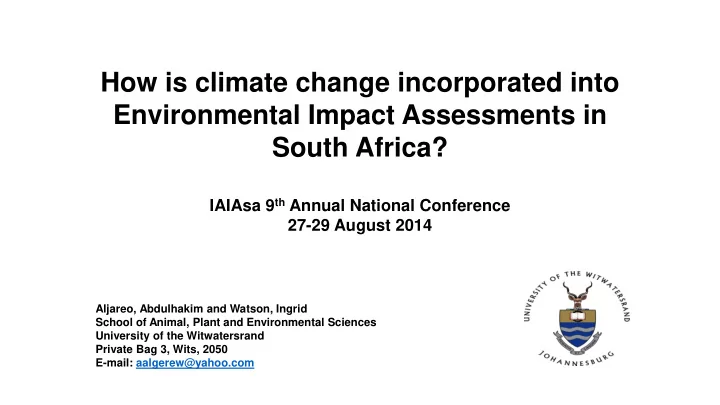

How is climate change incorporated into Environmental Impact Assessments in South Africa? IAIAsa 9 th Annual National Conference 27-29 August 2014 Aljareo, Abdulhakim and Watson, Ingrid School of Animal, Plant and Environmental Sciences University of the Witwatersrand Private Bag 3, Wits, 2050 E-mail: aalgerew@yahoo.com
Background • Climate Change Impacts • Environmental – ecosystem functions & processes, water resources • Social - livelihood sources, limited capacity, settlements in coastal lowlands • Economic – infrastructure damage, food security • Impacts in South Africa • Changes in rainfall & evapotranspiration, increasing temperatures, water availability, sea level rise, health issues, economic losses, impacts on biodiversity systems and agricultural sector
Background • National Climate Change Response Strategy (2011) • Purpose For an effective climate change response and the long-term, just transition to climate-resilient and lower-carbon economy and society in SA • Objectives: Support sustainable development Participate in the international efforts to mitigate GHGs in a way that does not affect SD in SA • Climate Change Mitigation • Climate Change Adaptation
Research Questions How is climate change incorporated into EIAs in South Africa? 1. How is climate change incorporated in the EIA legal regime? 2. How is climate change considered in the practice of EIA in SA, using Gauteng as a case study?
Methodology Descriptive and qualitative methodological approach 1. Reviewing climate change incorporation into EIA legal regime and related legislation • Direct and implied climate change incorporation 2. Reviewing 21 EIA’s from Gauteng (2010 – 2013) • Direct and implied climate change incorporation • Consideration of mitigation, adaptation and baseline adaptation (Larsen, 2013) • EIA for mining, SEA and BA not included 3. Key informant interview • Discuss results and EAPs experience with EIA and climate change
Results • Climate Change not directly incorporated into EIA legislation or practice, but implied in NEMA
Results • Key informant interviews • None had considered climate change in EIA practice locally • One EAP had considered climate change in an international project, based on IFC standards • Noted that climate change should be considered in conjunction with other IA tools, such as SEA • Noted a number of challenges for climate change consideration in EIA
Discussion Climate change not stated explicitly in 2010 EIA regs, or other legislation reviewed • Policy not (yet) translated into law • Policy development timeline • Lack of cooperation between government departments • Lack of understanding and information • Lack of human capacity and financial resources
Discussion Climate change implied in EIA legal regime • 2010 EIA Regs • Cumulative impacts • Listing Notice 2 – activities no. 1, 4, 5 and 17 • Linkage between EIA, IEM objectives and Sustainable Development • NEM:AQA • Atmospheric Emissions License process
Discussion Climate Change is not incorporated into EIA practice • No direct legal requirement to do so • Limited information – few climate change forecasts of local impacts • EIA process problematic
Discussion (cont.) Is EIA the appropriate tool to consider Climate Change? • Concerns around the effectiveness of EIA in SA generally, adding Climate Change may be problematic • Cost, time and capacity • International issues – lack of capacity, tools, policy, guidance & incentives
Recommendations • EIA can contribute to climate change mitigation and adaptation, especially when used together with other IEM tools • Direct incorporation into EIA regs • Assessment climate change concern during scoping • Additional listed activity – based on activity and/or receiving environment • Develop guidelines • Availability of data & modelling technology
Recommendations (cont.) • Enhanced role of SEA & EMF • Mainstream climate change across government departments • Increase capacity of EAPs & regulators • Supporting role of EAPSA & IAIAsa
Thank you Questions ?
Recommend
More recommend